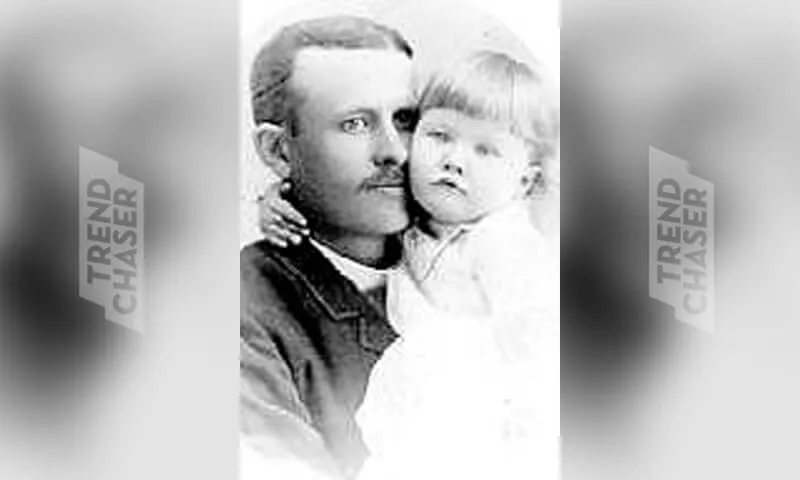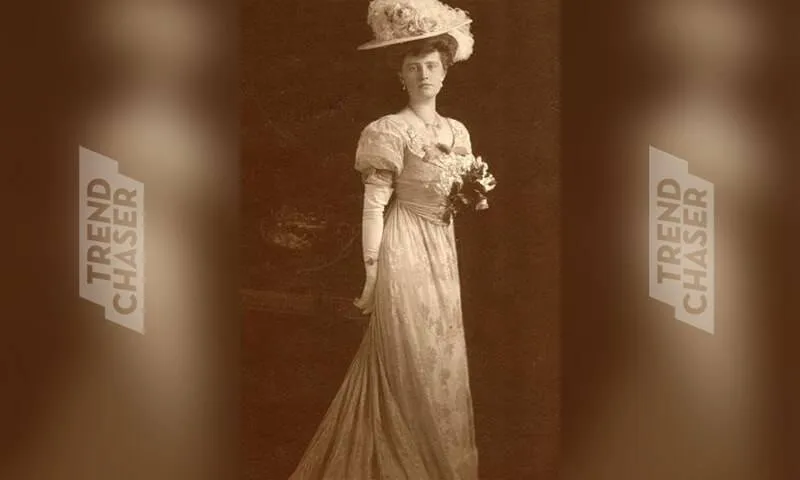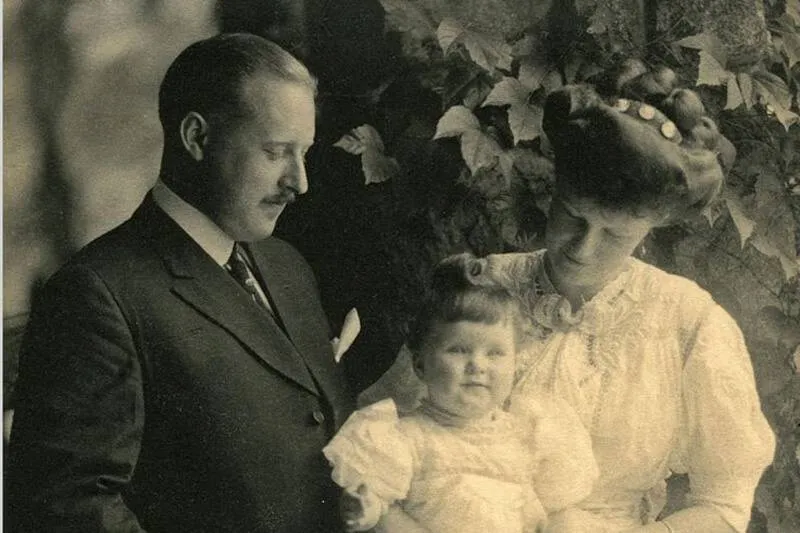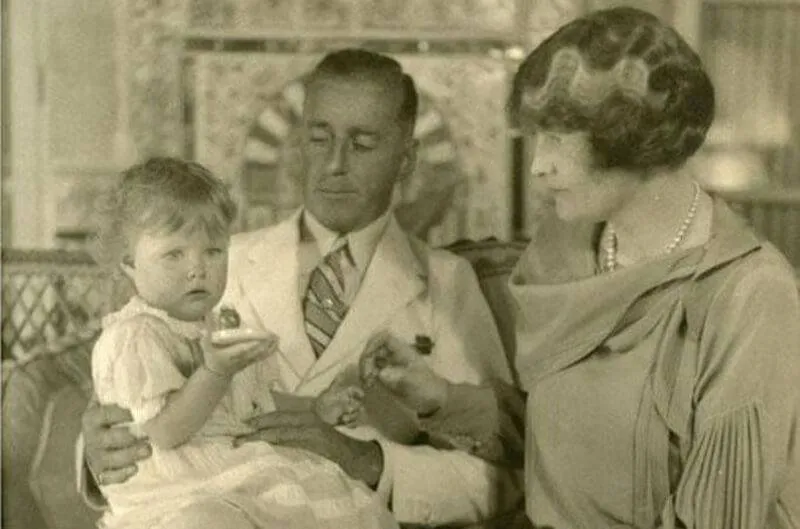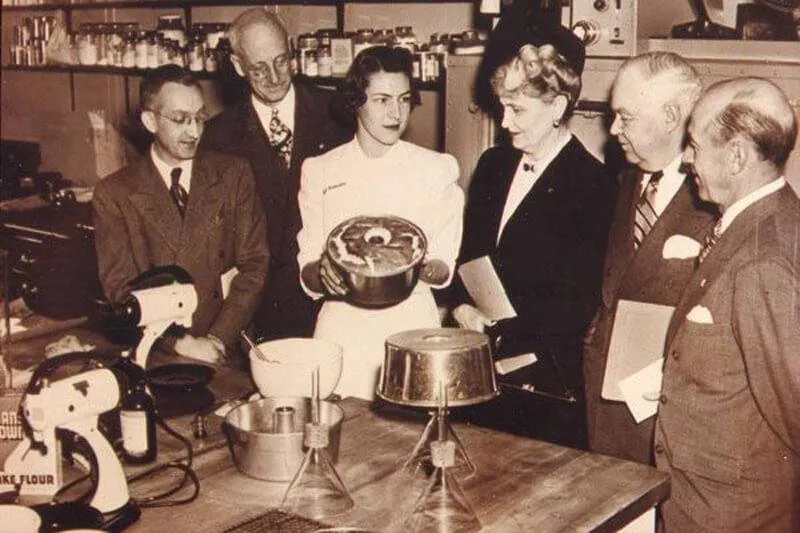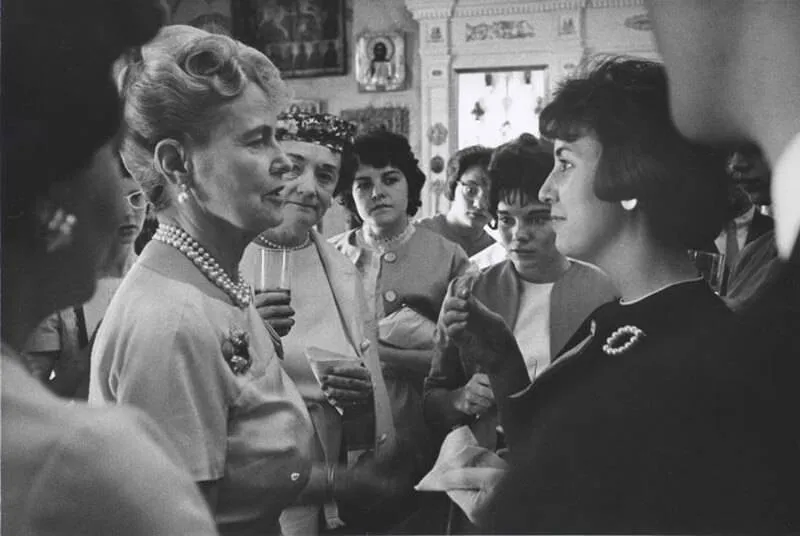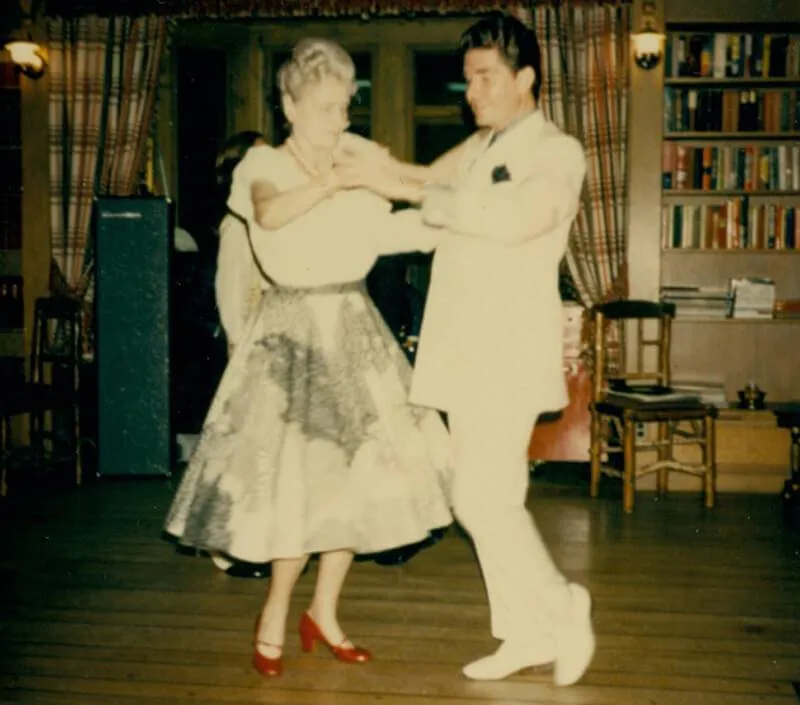Marjorie Merriweather Post: The Life Of The Wealthiest Woman In America And Original Owner Of Mar-a-Lago
If America ever had an empress, it would be Marjorie Merriweather Post. Heiress to the Post cereal fortune and four-times divorced, Marjorie was a socialite whose wealth was extraordinary. It enabled her to build estates like Mar-A-Lago, the fate of which would land in the hands of a modern-day president. But for how deep her pockets were, she knew that wealth meant nothing if it wasn't in the service of others. It was her father who gave those wise words and whose tragic suicide would inevitably make her the wealthiest woman in America.
Her Father Humbly Invented Postum Cereal
Marjorie Merriweather Post was born in Springfield, Illinois in 1887. She was the only child of C.W. Post and Ella Merriweather, both from middle-class backgrounds. In 1894, C.W. Post developed Postum, a coffee alternative drink made of wheatberries, bran, and molasses.
As a child, Post would help her father sell Postum to stores with no success. C.W. Post then developed a major advertising campaign to generate a demand for his product. The ads helped boost sales of Postum and by the time Marjorie was a teenager, her family had become multi-millionaires.
She Learned The Company At A Young Age
Despite her family's newfound wealth, Post maintained humble beginnings and her father instilled valuable lessons. Wanting to keep the business in the family, Marjorie's father taught his only child the different aspects of the company. He had her put labels on products, sit in on company meetings, and visit factories to study how their products were manufactured.
Post was then sent to finishing school at Mount Vernon Seminary in Washington, D.C. because her father wanted her to have a place in society. At 16, she met Edward Bennet Close, a young lawyer from Connecticut, who proposed marriage a mere four days. Her father insisted she wait two years to marry Close, and she obeyed.
Post Rose In Society As She Inherited Millions
After waiting two years, Post married Close in 1905, marking her official entrance into high society. However, some believed she still didn't come from the right family despite already being well known. The year before, C.W. Post left Marjorie's mother to marry his young secretary, Leilah Young, to whom he'd leave half of his stock.
Then suddenly in 1914, C.W. Post took his own life. Marjorie Post put her grief aside, however, and acquired the family business and fortune. With the help of her lawyer husband, Post found proof that her father promised all his stock to her, buying out Young for $6 million, which is worth $147 million today, with inflation.
She Used Her New Wealth To Support The War

At 27-years-old, Marjorie Merriweather Post became the owner of Postum Cereal Company, which quickly became worth hundreds of millions of dollars. By then, she remembered that her father taught her that wealth should be in the service of others, which she made her life's mission.
When the U.S. joined WWI, Marjorie took her mission to heart. Not only did she send her husband off to war, but she also donated money to the largest U.S. field hospital in France. She sent $75,000 worth of supplies to Europe and when the ship carrying those supplies went under she did it all over again, sparing no cost.
With Her Husband Away, She Became Her Own Woman
Her husband away at war, Marjorie Merriweather Post spent those years becoming an independent, cultured woman. She engrossed herself in the New York art scene and decorative arts by taking art history classes and visiting museums.
At this time, she also experienced more freedom and maintained a strong presence in New York social circles. By the time Close came back from the war, it was clear that the couple had grown apart. In 1919, Post filed for divorce after 14 years of marriage and two daughters. The following year, she married self-made millionaire E.F. Hutton, who'd built his own stockbroking company.
Post And Her Second Husband Owned Many Lavish Properties
Post and E.F. Hutton lived a life of luxury straight out of the Roaring '20s. During this time, they owned numerous properties, including a 54-room apartment in New York City, the Hillwood estate on Long Island, and the Topridge camp in upstate New York.
Each property was a prime example of Post's distinct, opulent taste and served as testaments to just how rich she really was. The New York apartment, for example, was completely furnished with 18th-century French antiques, including a desk that belonged to Marie Antoinette. But none of those properties would top the seaside retreat she built in Palm Beach, Florida.
Post Begins Plans To Erect Mar-A-Lago

Palm Beach was the ultimate stomping grounds for the rich and famous at the time. Post loved it so much, she searched high and low for the perfect spot to build their own home there, which would become known as Mar-a-Lago.
She found a patch of quiet land between Lake Worth and the Atlantic Ocean (Mar-a-Lago means "ocean to lake".) Hutton gave Post a generous $1 million budget to build a home. To design the home, she enlisted architect Joseph Urban, who was known for creating theatre and opera sets. Building Mar-A-Lago took two years and the labor of 600 workmen.
Not Your Average "Little Cottage By The Sea"
In January 1927, Mar-A-Lago was completed. The sprawling estate exceeded its original budget and ended up costing $2.5 million. Hutton was known to say, "My wife and I were going to build a little cottage by the sea; look what I got!"
What he got was a lot. 115 rooms were built into Mar-A-Lago, each opulently decorated in Post's distinct taste. The dramatic home was the perfect setting for one of Post's other strong suits: entertaining. In later years, Post would host international dignitaries such as the Duke and Duchess of Windsor and even weddings for her staff's children.
Postum Cereal Company Evolves, But Post's Relationship Begins to Crumble
Meanwhile, business was booming. In 1923, Hutton became Chairman of the Board at Postum Cereal Company. With the help of Post behind the scenes, since it was taboo for women to be on the board of anything, she and Hutton put Postum Cereals through a period of rapid expansion.
Hutton began acquiring popular American food companies such as Hellman's Mayonaise, Jell-O, Baker's Chocolate, and more. By 1926, Postum Cereal Company was renamed General Foods. The acquisitions helped profits soar to more than $19 million a year, tripling the company's value. But as General Foods continued to grow, Post and Hutton began butting heads.
A Frozen Goose Got In Between Them
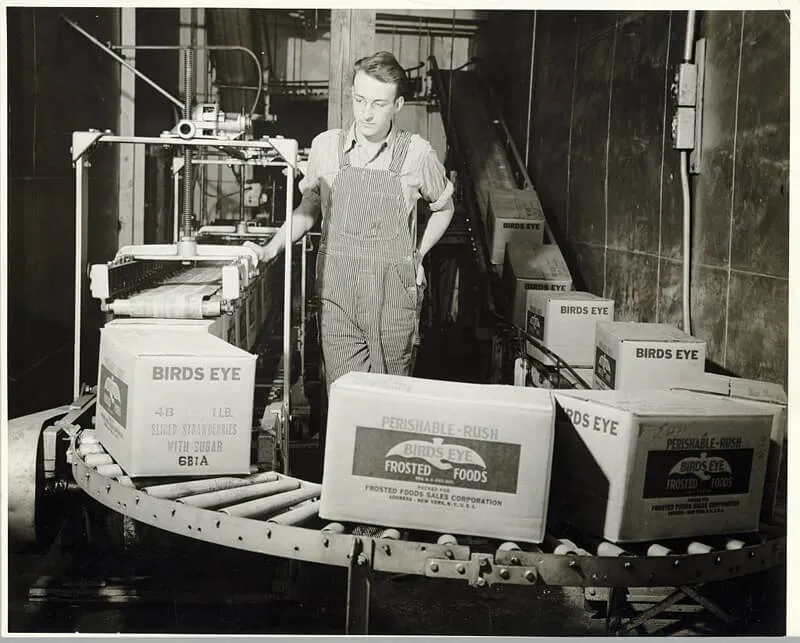
One day, after the family enjoyed goose on their yacht, Post asked the chef where it had come from as they were in the middle of the ocean. She discovered that the goose had been frozen and bought from Clarence Birdseye, who'd developed a new way to preserve food by freezing it.
Amazed at the idea, Post convinced Hutton to buy Birdseye's company. Though he was not on board, he begrudgingly gave in. After all, Post owned a majority of the company. It took a few years to take off, but Post was right about the frozen food revolution. However, the argument over this acquisition proved to be the beginning of the end for her second marriage.
She Shared Her Wealth During The Great Depression

When the Great Depression hit, the Post fortune was only slightly affected. Even then, General Foods continued to profit at over $19 million. Post would often vacation with her daughters on the family yacht, but that isn't to say she made the plight of Americans the least of her concerns.
She opened a soup kitchen in New York City for women and children, as most soup kitchens at the time were outdoors and frequented by men. Marjorie's was in an upstairs dining room, with tablecloths and a wait staff. Throughout the worst part of the Depression, her canteen served hundreds of thousands of people.
Post Finds A New Passion In Politics

America's nationwide poverty at the time sparked Post's interest in politics. She attended her first Democratic National Convention in Chicago in 1932 and became a supporter of President Roosevelt's campaign.
This didn't sit well with conservative Hutton, who made striking comments against Roosevelt's policies. Post was embarrassed, especially since he represented General Foods, which was her company. After she discovered his infidelities, she filed for divorce. She and Hutton were married 15 years and had one daughter (who became actress Dina Merrill.)
Post Took Control Of Her Life
Marjorie walked away from her second divorce as the wealthiest woman in America. She took sole ownership of properties acquired or built with Hutton. She also took her rightful place on the board of directors at General Foods.
Up until this point her say in anything was funneled through her husbands who represented her on the board. But now, she had direct control over her company, continuing to watch it grow as she acquired more brands and expanded internationally. Soon, that was complemented by Joseph E. Davies, a lawyer from Washington, D.C. who became her third husband.
Post Sets Sail For Life In Soviet Russia
With her position at the top of General Foods and her marriage to an established D.C. lawyer, Post began using her hosting skills to establish herself in Washington society. Not only did she throw legendary parties, she became a huge benefactor to President Roosevelt's reelection campaign.
When President Roosevelt was reelected in 1936, he appointed Davies as the U.S. Ambassador to Russia. They promptly took off for St. Petersburg in Post's yacht. This must have been quite a sight for Russian citizens, who were enveloped in communism by then. Despite her enormous wealth, the Russians took to Post quite well.
She Acquired Valuable Russian Art For Cheap
In Russia, Post's affinity for art was reignited. Hard pressed for money, Joseph Stalin opened up the storehouses where he kept valuable items taken from the Romanovs and other Russian aristocrats. At this point, people didn't collect Russsian art — not even the Russians — but Post knew she was looking at a gold mine.
When WWII was on the rise, Post and Davies packed up their treasures and headed back to the States. Her souvenirs are the largest collection of Russian art outside of Russian. It includes artworks, Faberge pieces, and even porcelain dining ware that belonged to Empress Catherine the Great.
Post Was At The Height Of Society, But Her Marriage Failed Again
When they returned to Washington, D.C., Post returned to wining and dining with the Capitol's finest. Her spring garden parties were one of the hottest events of the year and she quickly found herself at the height of Washington society.
But of course, it wasn't perfect. Soon, her marriage started to deteriorate as Davies' leftist sympathies and crabby demeanor made them realize they had little in common. She quietly sought a divorce out of state and was a divorcée yet again. In those days, a third divorce equaled social suicide, but an exception was made in Post's case. It wasn't long before she found herself in the arms of a new man.
She Divorced Her Last Husband After Finding Out He Was Gay
In 1958, Post walked down the aisle for a fourth and final time. She married Herbert A. May, a Pittsburgh businessman with whom Post had a lot in common. He was a tall, silver fox that was still pretty fit for his age and he loved entertaining just as much as she did.
But like all her marriages, this too, wouldn't last. After five years, someone outed May as a homosexual to Post. Apparently, everyone besides Post knew about this, which only added to her embarrassment. Post ended up getting her final divorce, but at least she still had love and respect for May.
There Were Rules To Follow At A Post Function
As you know by now, Marjorie Merriweather Post was quite the entertainer. Though she spent hundreds of thousands of dollars on her extravagant parties, she still maintained an air of humbleness.
She wasn't too ashamed to serve her guests Jell-O or even Postum Coffee alongside caviar and cocktails. But for how generous Post was, there were certain rules she expected guests to follow. Dinner was always served on time, even if an important guest was late. She also offered high-heeled guests pads to put on the bottoms of their shoes to avoid scuffing up her floors.
Post Opened Mar-A-Lago To Entertain The Less Fortunate
Mar-a-Lago may have been used as her residence at one point, but Post didn't enjoy the vast expanse of her estate all to herself. She often opened up her home to many charitable causes and people from all ranks of life.
In 1944, Post opened it up to WWII veterans who needed occupational therapy. In 1929, she hosted a charity fundraiser and even managed to get the Ringling Bros. and Barnum & Bailey Circus to perform. Not only did the proceeds benefit charity that day, but she also invited underprivileged children to Mar-a-Lago to see the circus.
Lauren Bacall's $26 Million Central Park Apartment
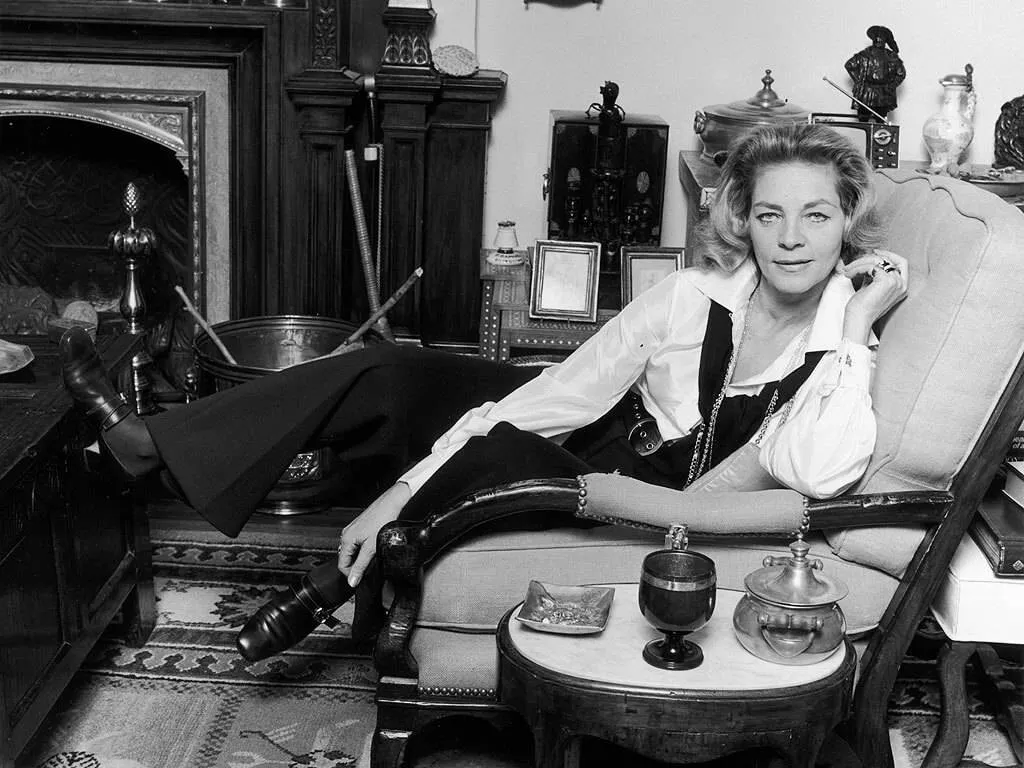
It's no surprise that with all of her success, the actress had an amazing home. In 2015, just a month shy of her 90th birthday, the legendary icon passed away and left behind her amazing Central Park apartment.
With the home on the market, we finally got a glimpse inside the $26 million stunner.
The Most Coveted Real Estate In New York City
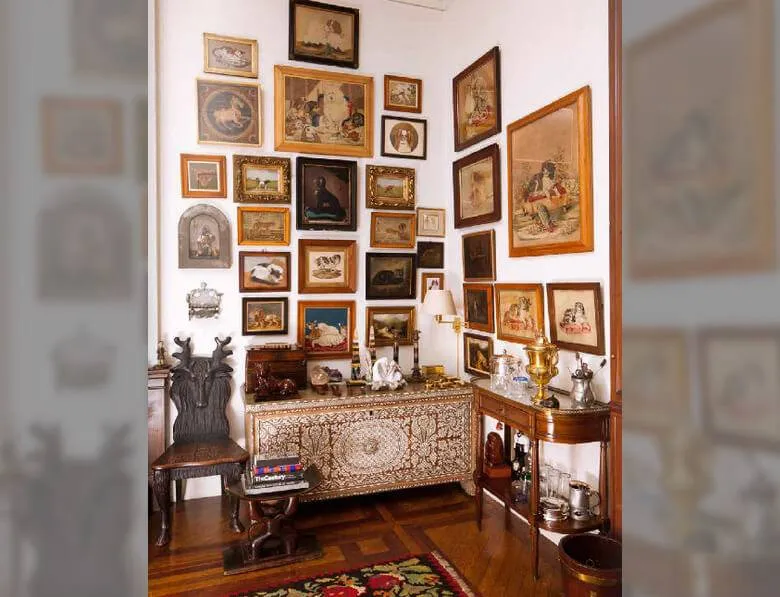
The apartments directly across from New York City's Central Park are some of Manhattan’s most expensive real estate. Lauren Bacall’s mansion, which she called home for 53 years, went to auction last week at the price of $26 million. So, what the heck are you getting for $26 million?
Doesn’t that cost more than Taylor Swift’s mansion in Rhode Island? Yes; however, Bacall’s digs are located in the historical Dakota Building on the Upper West Side. With nine entire rooms, this apartment hardly feels like an apartment at all, but rather an entire house placed inside of the Dakota Building’s gorgeous architecture.
Nine Massive Rooms

Lauren Bacall's apartment inside the Dakota Building (one of the most famous properties in NYC history) was gigantic, and the floor plan shows the sheer size of the rooms within. The master bedroom is a massive 22 feet wide and opens into a private study, bathroom and walk-in closet.
It also has a gorgeous balcony looking over Central Park. The kitchen is not your average NYC apartment kitchen. It’s not shoved into a corner. It’s actually an eat-in kitchen which opens up into a 24 foot by 19 foot dining room and a family room. Bacall’s home also includes a guest bedroom, a library and a gallery.
Bacall's Dining Room, With French-Inspired Design

Bacall was a fan of French-inspired design. This is evident in her furniture choices, many of which are in the style of Louis XIII (you'll see what just a pair of Louis XIII-style chairs sold for later).
Bacall’s dining room brings these French elements together. The color pallet is flawless, opting for rusty reds and deep blues which can be seen accented in the chair upholstery, rug and wall hanging. The wall hanging is actually the star of the dining room. The Bell Époque French poster by Jules Cheret sold for a whopping $7,000.
French Posters And Fine China In The Formal Dining Room
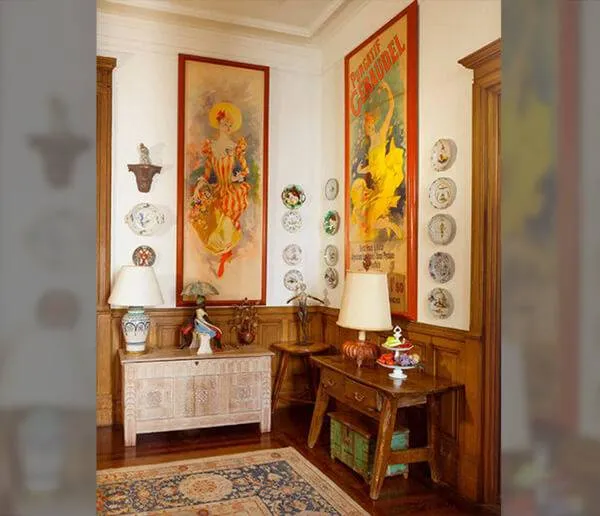
Like most of the rooms in her massive, nine-bedroom apartment, Lauren Bacall had an overall French theme to her formal dining room. In addition to the Bell Époque French poster which sold for $7,000 in auction, the actress had a number of French posters hanging on the dining room's walls.
She paired these posters with expensive, highly collectible china, that instead of using she hung as art pieces next to the framed posters. This corner of Bacall’s dining room shows just how much of a collector she truly was, with decorative lamps and art-pieces topping the surface of every piece of furniture.
Unique George III Style Dresser Sold For $6,875

Though Bacall favored French design, she also included pieces from other countries and periods. Her antique George III oak Welsh dresser, which displayed her collection of fine china, was from the late 18th century.
Though the style is straight from the United Kingdom, George III pieces are actually an English interpretation of Rococo (in other words, they're based on that classic, French style Bacall loves). Bacall’s dresser, which sold for $6,875, was made from oak, a unique choice for pieces from that time. George III style furniture typically uses Mahogany. Sometimes painted satinwood and giltwood would be used, but rarely oak.
The Pretty Pink Master Bedroom

Like the rest of her apartment, Bacall's bedroom is dripping in prized pieces of artwork. Behind her bed is another gallery wall, undoubtedly worth a pretty penny. The master bedroom isn’t just something because of its furnishings; it also has a highly-coveted, unobstructed view of Central Park. Could this be the most expensive room in NYC real-estate? Maybe. Imagine a life where you sit in the bay windows of your mansion-sized apartment and look out on the peaceful, green Central Park. Imagine!
Bacall’s choice of color in her bedroom is also interesting considering most of her other rooms are blue, brown and white. Here she chose very feminine lavender and pink tones, which aren’t seen anywhere else in her apartment.
The Master Suite
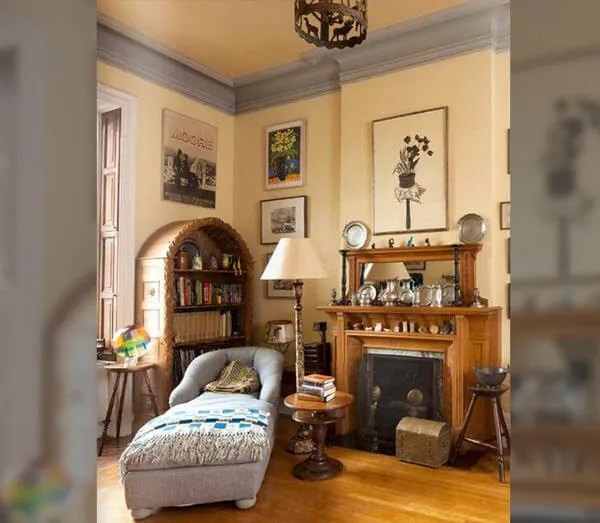
Bacall liked to fill every inch of a room with antique furniture, art and collectibles. The master suite is the only place where something seemingly new is placed. Adjacent to the working fireplace, which is adorned by a number of collectible metal plates and figurines, is what appears to be a very modern lounge.
The lounge actually ties the room together quite nicely, making this room appear more cozy than cluttered (which is a fine line when you're a longtime collector like Bacall). Behind the lounge is a bookshelf, filled again with knickknacks and books. Guests who are enjoying the fireplace can also relax with some reading.
More Gallery Walls In The Master Suite
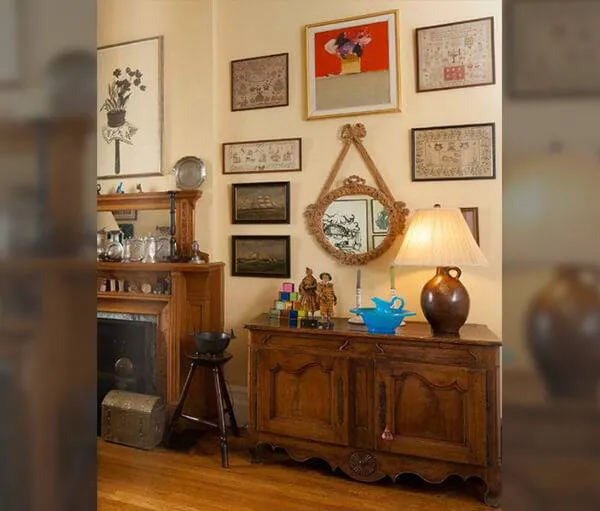
The fireplace by the master suite is the perfect display case for Bacall's collection of decorative metal plates and candlesticks. Next to the fireplace is yet another gallery wall with framed portraits of ships and floral designs. Bacall is not afraid to use accents of color.
Next to what appear to be two clown figurines is a bright blue decorative piece that really stands out among the wash of browns. The reason Bacall’s apartment can have so much art is because the walls are a whopping 13 feet high. This place is definitely catered to an art collector because there’s a lot of picture frame real estate.
Yellow Walls In The Guest Bedroom
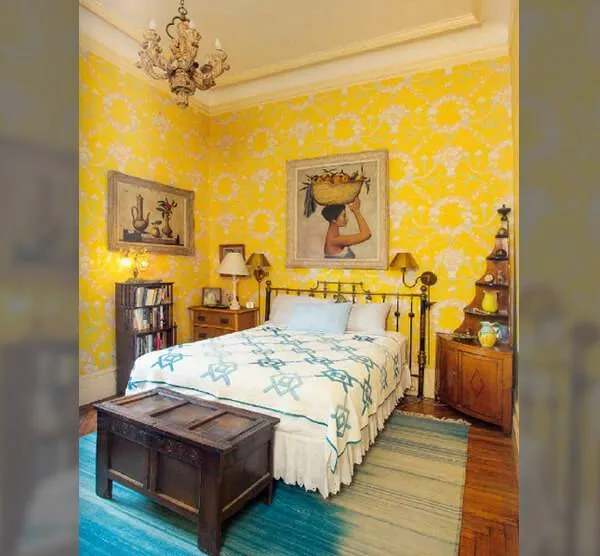
Lauren Bacall went for an interesting choice in her guest bedroom – bright, cheerful, yellow walls. The pattern screams opulence whilst the color screams whimsical fun. Above the bed hangs a very expensive piece of artwork dating back to Spain in the 1920s. This piece, which depicts a woman holding a basket of fruit, was painted by Andrew Segovia and sold for a whopping $18,750 at auction.
Bacall kept her themes of robin's egg blue in the guest bedroom. Though the walls are a cheerful shade of yellow, the bedspread and rug match her living room couches and walls. She also has a unique, tiered shelving piece resting in the room’s right corner and adding an interesting touch to the overall look.
A Palette Of Natural Blue And Robin's Egg Blue

Bacall's living room was quite formal, but she was known for her style. This is probably why she chose to paint the space a refreshing shade of robin’s egg blue, which brightens up the entire room and works wonderfully with the space’s natural light.
Throughout the room, there are blue accents that really tie her collection of vintage knick-knacks together – everything from the statues on the fireplace mantle to the pattern on the comfy-looking couches. Bacall also collected animal accent pieces and had two Indian-inspired elephant statues set alongside a camel and crane statue.
A Baby Grand With Framed Figure Drawings
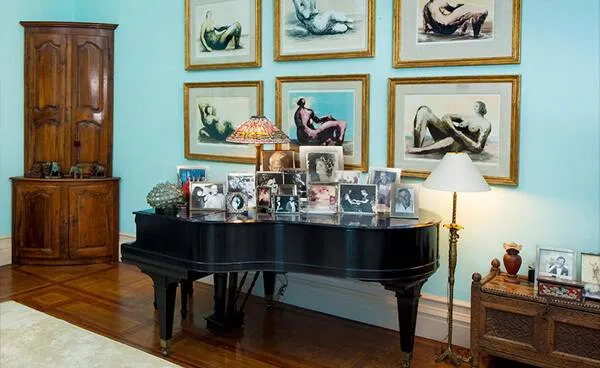
What's a lux New York City apartment without a baby grand piano? We don’t even want to think about how difficult it was to get that thing in there, but it’s absolutely gorgeous. The piano is by Mason & Hamlin, a premier New England-based piano company that was founded in 1854.
The piano sold for $6,875, just above the starting price for a new piano of that caliber. The original value was likely much, much more. Though Bacall was a great supporter of the arts, it didn’t look like she did much playing in her old age. The piano appears to be a more of a table for displaying her old family photos.
Carved Fireplaces, Crown Moldings, and Not Your Average Grandmother's Couches
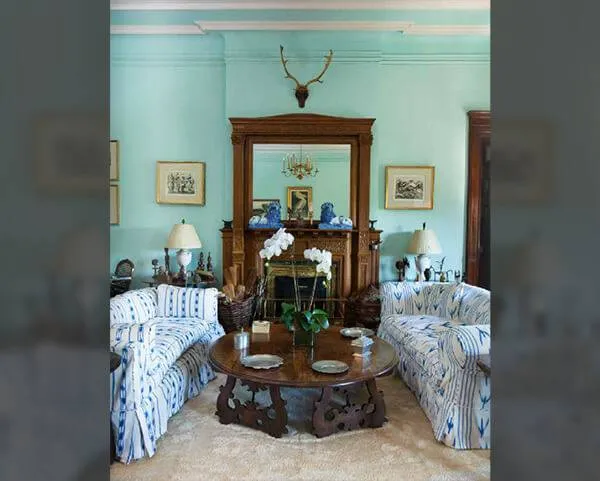
These couches look comfortable, but they're not your average grandmother’s sofa. They’re Lauren Bacall’s and chosen to perfectly accent her living room’s wall color. Patterned couches are sometimes hard to pull off, but these actually ground the room. Since they’re white, they offset the dark wood of her gorgeously-carved fireplace and coffee table.
Bacall’s grand apartment actually has a whopping five working fireplaces – an increasingly rare sight, especially for a New York City apartment. Each is mantle is detailed with gorgeous ornate carvings. This particular fireplace is accented with a deer head above the mantle, a nod to her overall theme of wildlife.
Ornate French Style Mirrors And Antique Dressers In The Master Suite
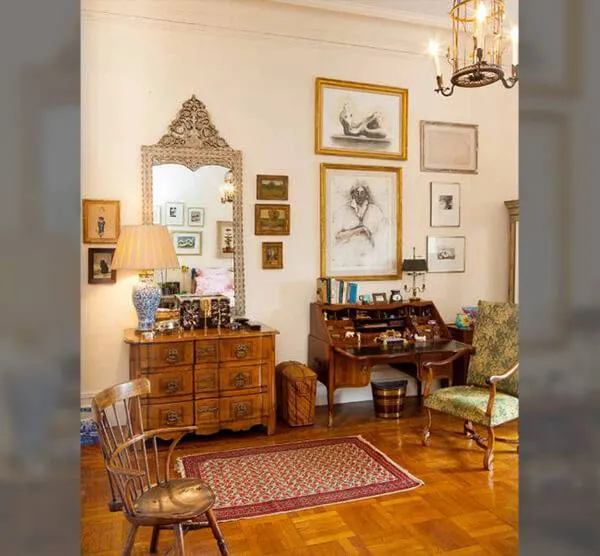
It's not just that Bacall’s apartment had nine whole rooms, it’s that the rooms are actually gigantic allowing her to have tons and tons of gorgeous antique furniture. In this room, an ornate French-style mirror rests on a Regence Provincial Walnut Commode. This mid-18th-century piece sold for $3,750.
The room also has an antique secretary desk which was crafted with French style. The Louis XV provincial bureau was crafted from walnut in the mid-to-late 18th century and sold for $5,000. Both of these pieces complement the wood floor.
Bacall Was A Collector

Bacall lived at the Dakota from when she was about 36 years old until she was 89. A lot happens when literally your entire life goes by, and throughout her many years, Bacall collected art and antiques. Bacall's home is practically an art museum with gallery walls enclosing the main living space.
Nearly every spare inch of wall space in her living room was covered in framed art – from expensive paintings (some more modern than others) to photographs and prints. Not to mention, Bacall’s nine-room stunner also had a working fireplace, a rare sight for a New York City apartment.
Bacall's Pelican Painting Sold For $173,000

Bacall's art collection was worth even more than her furniture. This original print of American White Pelican by James Audubon sold for $173,000. Audubon was an ornithologist, naturalist, and painter. He gravitated towards painting birds in their natural habitats and American White Pelican truly showcases his niche.
Audubon’s most major work is a color-plate book called The Birds of America (1827-1839) which is one of the first ornithological works ever completed. His goal was to paint one page each day and he massively succeeded. Audubon identified 25 new species of birds in his anthology – who says art and science can’t be one?
Bacall's Antique Louis XIII Walnut Fauteuils Sold For $1,875

We don't often think about dropping nearly two grand on a couple of chairs unless you’re in the world of antiques. Lauren Bacall’s antique Louis XIII-style chairs were in excellent condition, and they really made a great addition to her already stunning home. The little bits of blue stitching on the upholstery really complimented her Robin’s egg walls.
The pair of these chairs sold for $1,875, and are what some consider the top tier of French design. Louis XIII furniture featured veneer turned wood and moldings. It always leaned towards the architectural and walnut was a commonly used wood (along with ebony, oak, pearwood, and pine).
Ultra-Chic Louis Vuitton Luggage

Louis Vuitton luggage is a must-have for celebrities today and even celebrities of yesteryear. The company founded in 1854 and has been purveyors of luxury style since then. With Lauren Bacall's classic, timeless style, it’s no surprise that she had a set of monogrammed Louis Vuitton luggage.
In modern times, you may see celebs like Kim Kardashian (and the whole Kardashian-clan) toting around the canvas suitcases. A single duffle can set you back nearly two grand, but Bacall’s is vintage, which means it’s exceedingly rare and uber-expensive. Bacall’s collection of Louis Vuitton luggage sold for a very steep $37,500.
Lauren Bacall's Director’s Chair
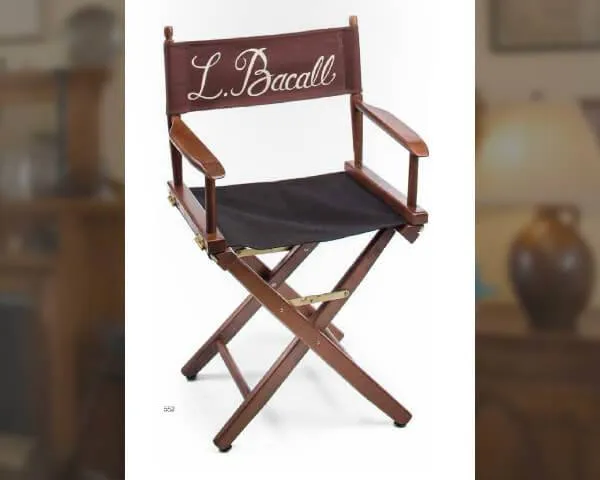
Lauren Bacall's apartment isn’t just filled with art and antiques; it also has pieces of Hollywood history. This chair is the actress’ personal director’s chair, which many would consider priceless, though it sold for $4,750 in the auction.
Before the actress was Lauren Bacall, she was Betty Joan Perske. The second she changed her name and debuted in To Have and Have Not, she began a long legacy of Hollywood stardom. From acting alongside Marilyn Monroe to her final role as a voice actress in the 12th season of Family Guy, Bacall was a star and a hard worker. The actress worked up until the very last year of her life when she tragically died from a stroke.
Bronze Sculptures
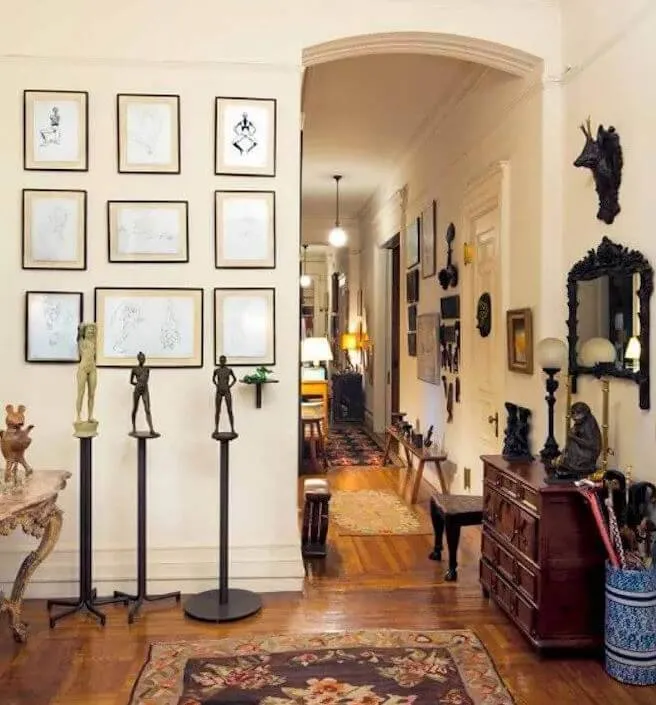
Lauren Bacall filled her home with amazing works of art, including three bronze sculptures that reportedly fetched more than $30,000 when they were auctioned after her death.
The three sculptures pictured above were created by sculptor Robert Graham, who was famous for designing the entrance gates for the 1984 Olympics. The sculptor was also married to actress Anjelica Houston, which is how he and Bacall met. the two remained friends for many years, and Bacall fell in love with his portrayal of the female form. Bacall purchased the three bronze sculptures from Graham which depicted naked women in natural poses. The art remained in Bacall's foyer for years and she playing referred to them as "her girls."
Raw Sketches Beautifully Framed
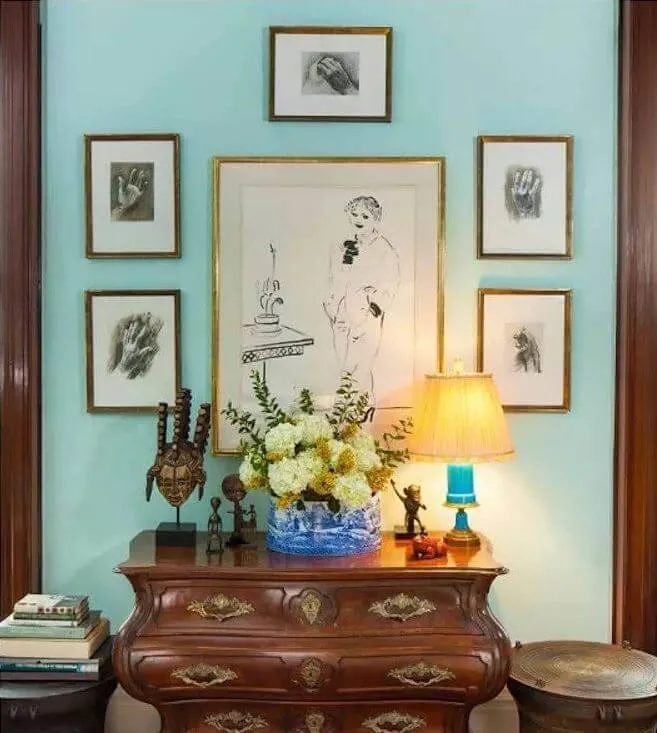
In one of her last interviews, Lauren Bacall sat down with Vanity Fair and discussed her impressive career and how her New York City apartment had become a "map of memories" of times passed.
Lauren Bacall owned artwork by numerous renowned artists, painters, sculptors and more. Amongst her personal collection included works by John James Audubon, Max Ernst, David Hockney, Jim Dine, Henry Moore and many more.
Divine Wood Furnishings
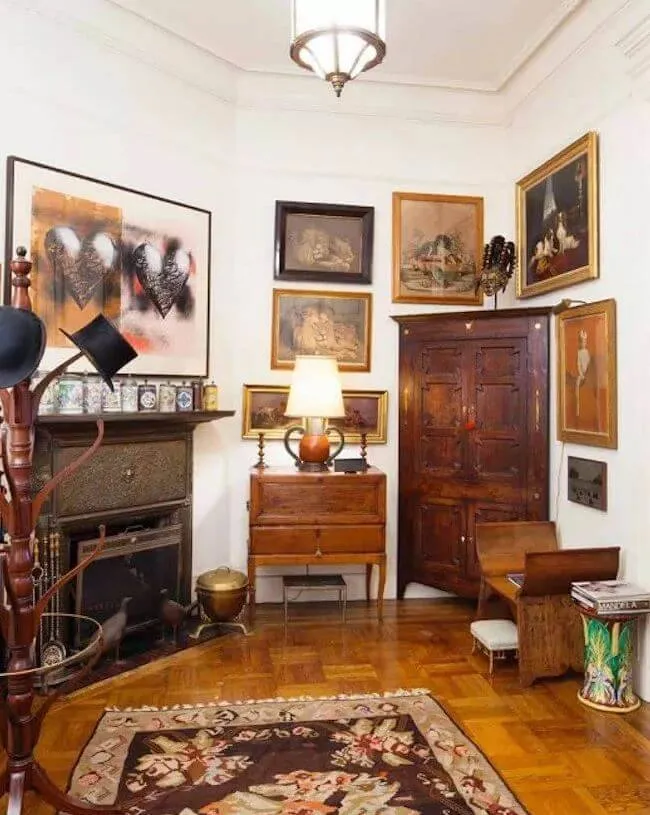
The unique wood furnishings in her apartment, both decorative and functional, are one of the themes throughout the rooms. The interior of the New York City apartment wasn't flashy and glamorous, as many might expect of a Hollywood star.
Instead, the hand-carved wooden benches, dressers, and bureaus provide a sense of coziness and the feeling that the apartment is lived in and loved, not just staged and to be admired from afar.
Sweeping Views Of Central Park

In New York City, real estate is drastically increased if you have an enviable view. And there are few views more coveted than beautiful Central Park. Lauren Bacall's apartment has approximately 100 feet of Central Park frontage. This means nearly half of the apartment has a breathtaking view of the serene park.
In a 1978 issue of French Vogue, Lauren Bacall said of her apartment, "Outside that window lies Central Park; my relief from the city, an important reason to live there."
Extravagant Exterior

The exterior of Bacall's apartment building stood tall on the corner of Central Park West and West 72nd Street. While traffic flows by the grand building, it stands in place, holding its history, preserved and poignant.
Overlooking Central Park, this building is one of the beautiful things about New York City, as it’s full of history, icons, and the essence of possibility and fulfilling dreams. The value of the building has grown to enormous proportions, and it’s easy to see why.
Roses Adorned Her Gate A Day After She Passed

Lauren Bacall passed away on August 12, 2014 at her Dakota apartment where she lived for more than 50 years. According to her son, Bacall passed away after suffering a massive stroke. She was just five weeks shy of her 90th birthday. Upon hearing of her passing, fans decorated the iron gate outside of her apartment with roses to pay their respects.
Over the weeks following her death, fans from all over the country visit her former apartment, leaving gifts and paying respect to one of the last actresses from the Golden Age.










